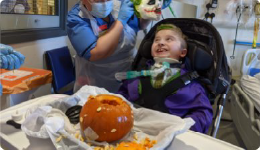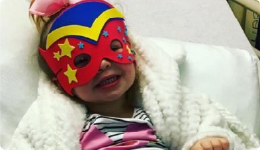There are lots of books about emotional development for children, young people and for the adults caring from them. Your local library might have some of the books below.
Inverclyde Libraries
East Dunbartonshire Libraries
East Renfrewshire Libraries
Glasgow Libraries CAMHS worked together with Glasgow Libraries to develop Shelf Help a list of books about emotional development available to borrow.
Renfrewshire Libraries
West Dunbartonshire Libraries
Anger
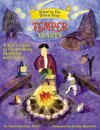 What to Do When Your Temper Flares by Dawn Huebner and Bonnie Matthews
What to Do When Your Temper Flares by Dawn Huebner and Bonnie Matthews
Engaging examples, lively illustrations, and step-by-step instructions teach children a set of anger dousing methods aimed at cooling angry thoughts and controlling angry actions, resulting in calmer, more effective kids.
 What to Do When It’s Not Fair by Jacqueline Toner, Clare Freeland and Dave Thompson
What to Do When It’s Not Fair by Jacqueline Toner, Clare Freeland and Dave Thompson
What to Do When It’s Not Fair guides children and their parents through the difficult emotion of envy and jealousy using strategies and techniques based on a cognitive-behavioural principles.
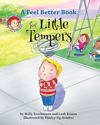 A Feel Better Book for Little Tempers by Holly Brochmann, Leah Bowen and Shirley Ng-Benitez
A Feel Better Book for Little Tempers by Holly Brochmann, Leah Bowen and Shirley Ng-Benitez
A Feel Better Book for Little Tempers assures little kids that anger is normal - everyone gets angry sometimes, even adults!
Anxiety/Worry/Stress
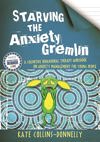 Starving the Anxiety Gremlin: a cognitive behavioural therapy workbook on anxiety management for young people by Kate Collins-Donnelly
Starving the Anxiety Gremlin: a cognitive behavioural therapy workbook on anxiety management for young people by Kate Collins-Donnelly
Starving the Anxiety Gremlin is a unique and award-winning resource to help young people understand different types of anxiety and how to manage them, including panic attacks, phobias, social anxiety, generalised anxiety and obsessive compulsive disorder.
 Starving the Exam Stress Gremlin : a cognitive behavioural therapy workbook on managing exam stress for young people by Kate Collins-Donnelly
Starving the Exam Stress Gremlin : a cognitive behavioural therapy workbook on managing exam stress for young people by Kate Collins-Donnelly
Part of the award-winning Starve the Gremlin series and full of engaging activities, this self-help workbook explains what exam stress is, how it develops and the impact it can have - providing the reader with an understanding of their own exam stress.
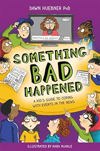 Something Bad Happened: A kid’s guide to coping with events in the news by Dawn Huebner & Karen McHale
Something Bad Happened: A kid’s guide to coping with events in the news by Dawn Huebner & Karen McHale
Something Bad Happened guides children ages 6 to 12 and the adults who care about them through tough conversations about national and international tragedies.
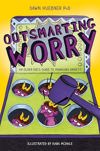 Outsmarting Worry: An older kids’s guide to managing anxiety by Dawn Huebner and Karen McHale
Outsmarting Worry: An older kids’s guide to managing anxiety by Dawn Huebner and Karen McHale
Outsmarting Worry teaches 9-13 year olds and the adults who care about them a specific set of skills that makes it easier to face - and overcome - worries and fears.
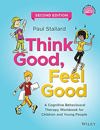 Think Good, Feel Good: A Cognitive Behavioural Therapy Workbook for Children and Young People by Paul Stallard
Think Good, Feel Good: A Cognitive Behavioural Therapy Workbook for Children and Young People by Paul Stallard
Think Good, Feel Good is an exciting, practical resource that helps to help children and young people understand Cognitive Behaviour Therapy. It provides a range of flexible and highly appealing materials that can be used to structure and facilitate work with young people.
 Fighting Invisible Tigers: Stress Management for Teens by Earl Hipp
Fighting Invisible Tigers: Stress Management for Teens by Earl Hipp
Stress is something we all experience. But research suggests that adolescents are affected by it in unique ways that can increase impulsivity and risky behaviours. While eliminating stress from life isn't realistic, young people can learn to control how they respond to it.
 The Relaxation and stress reduction workbook for Teens by Michael Tompkins and Jonathan Barkin
The Relaxation and stress reduction workbook for Teens by Michael Tompkins and Jonathan Barkin
Between school, friends, dating, the latest drama on social media, and planning for the future-today's teens are totally stressed out. Based on the self-help classic, The Relaxation and Stress Reduction Workbook, this evidence-based guide will help teen readers identify the underlying causes of their stress, anxiety, and worry. Teens will also learn to develop a game plan for reducing stress so they can focus on reaching their goals.
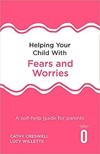 Helping Your Child with Fears and Worries: A self-help guide for parents by Cathy Cresswell and Lucy Willetts
Helping Your Child with Fears and Worries: A self-help guide for parents by Cathy Cresswell and Lucy Willetts
This extremely useful guide will enable you to understand what is causing your child's worries and to carry out step-by-step practical strategies to help him or her to overcome them.
 Relax Kids Pants of Peace: 52 Mindful Meditations for children by Marneta Viegas
Relax Kids Pants of Peace: 52 Mindful Meditations for children by Marneta Viegas
An innovative book that helps children get in touch with a wide range of inner qualities and values through creative meditation and affirmations exercises.
 Relax Kids The Wishing Star: 52 Meditations for children by Marneta Viegas
Relax Kids The Wishing Star: 52 Meditations for children by Marneta Viegas
Designed to counteract some of the tensions with which we are all familiar at the end of a busy day, and offer parent and children together some quality time to relax and share. The meditations and visualisations aim to develop children's imagination and provide them with skills that will be invaluable for the rest of their life.
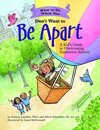 What to Do When You Don’t Want to Be Apart: A Kid’s Guide to Separation Anxiety by Kirsten
What to Do When You Don’t Want to Be Apart: A Kid’s Guide to Separation Anxiety by Kirsten
What to Do When You Don't Want to Be Apart guides children and their parents through the emotions underlying separation anxiety using strategies and techniques based on cognitive-behavioural principles.
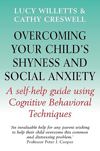 Overcoming your child’s shyness and social anxiety: A self-help guide using Cognitive Behavioural Techniques by Lucy Willetts and Cathy Creswell
Overcoming your child’s shyness and social anxiety: A self-help guide using Cognitive Behavioural Techniques by Lucy Willetts and Cathy Creswell
In Overcoming Your Child's Shyness and Social Anxiety, child psychologists Lucy Willetts and Cathy Creswell explain how parents can help a shy child learn to challenge their thoughts and behaviour patterns and learn to participate confidently in every aspect of their lives.
 The Shyness and Social Anxiety Workbook for Teens: CBT and ACT skills to help you build your social confidence by Jennifer Shannon
The Shyness and Social Anxiety Workbook for Teens: CBT and ACT skills to help you build your social confidence by Jennifer Shannon
The worksheets and exercises in The Shyness and Social Anxiety Workbook for Teens will help you learn to handle awkward social situations with grace and confidence, so you can make real connections with people you want to get to know.
Coping with Emotions
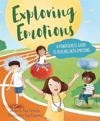 Exploring Emotions: A mindfulness Guide to Understanding Feelings by Paul Christelis and Elisa Paganelli
Exploring Emotions: A mindfulness Guide to Understanding Feelings by Paul Christelis and Elisa Paganelli
This mindfulness story book for children includes simple mindfulness activities, which have been shown to help relieve stress and anxiety and improve health and mental well-being. This book shows children how to cope with different emotions, from anger and jealous, to sadness and disappointment.

Stuff that Sucks: Accepting what you can’t change and committing to what you can by Ben Sedley
With a strong emphasis on validation and compassion, Stuff That Sucks encourages you to accept your emotions rather than struggling against them. It also shows how to reconnect with what is really important to you, giving you the tools to help clarify your personal values and take steps towards living a life where those values can guide you in your day-to-day behaviour.

Don’t Let your Emotions Run your Life for Teens: dialectical behaviour therapy skills for helping you manage mood swings, control angry outbursts, and get along with others by Sheri Van Dijk
In this book, you'll find new ways of managing your feelings so that you'll be ready to handle anything life sends your way.
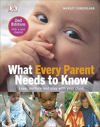
What Every Parent Needs to Know: Love, nurture and play with your child by Margot Sunderland
An essential read for any parent, Dr Margot Sunderland's bestseller What Every Parent Needs To Know explains what science can teach us about parenting. Covering everything from breastfeeding to brain development, this brand new edition includes the latest thinking on how screen time affects your child's brain, and a focus on how love, nurture, and play contribute to your child's development.
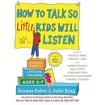
How to Talk so Little Kids will listen: a survival guide to life with children ages 2-7 by Joanna Faber and Julie King
Part of the internationally bestselling How to Talk... parenting series, this user-friendly guide gives insights and tried-and-tested strategies to navigate the everyday challenges of life with children ages 2-7, showing you how to put them into practice in real-life scenarios.
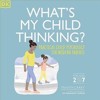
What's my child thinking? : practical child psychology for modern parents by Tanith Carey and Dr Angharad Rudkin
Covering all your child's developmental milestones from ages 2 to 7 years, What's My Child Thinking? covers important issues - such as temper tantrums, sibling rivalry, and peer pressure. What's more, there is a bank of practical "survival guides" for critical times, such as travelling in the car and going online safely.

The book you wish your parents had read (and your children will be glad that you did) by Philippa Perry
Every parent wants their child to be happy and every parent wants to avoid screwing them up. But how do you achieve that? In this absorbing, clever and funny book, renowned psychotherapist Philippa Perry tells us what really matters and what behaviour it is important to avoid - the vital dos and don'ts of parenting.
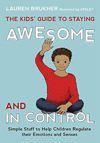
The Kids’s Guide to Staying Awesome and In Control: Simple Stuff to Help Children Regulate their Emotions and Senses by Lauren Brukner
Packed with simple ideas to regulate the emotions and senses, this book will help children tackle difficult feelings head-on and feel awesome and in control!
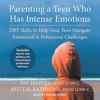 Parenting a Teen Who Has Intense Emotions: DBT Skills to Help Your Teen Navigate Emotional and Behavioural Challenges by Pat Harvey & Britt Rathbone
Parenting a Teen Who Has Intense Emotions: DBT Skills to Help Your Teen Navigate Emotional and Behavioural Challenges by Pat Harvey & Britt Rathbone
The teen years can be daunting for any parent. But if you are the parent of a teen who lashes out or engages in troubling behaviour, you may be unsure of how to respond to your child in a compassionate, constructive way. In this important book, two renowned experts in teen mental health offer you evidence-based skills for dealing with your teen's out-of-control emotions using proven-effective dialectical behavioural therapy (DBT).
 Have You Filled a Bucket Today? A Guide to Daily Happiness for Kids By Carol McCloud
Have You Filled a Bucket Today? A Guide to Daily Happiness for Kids By Carol McCloud
This heart warming book encourages positive behaviour as children see how rewarding it is to express daily kindness, appreciation, and love.
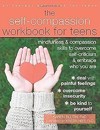
The Self-Compassion Workbook for Teens: Mindfulness and compassion skills to overcome self-criticism & embrace who you are by Karen Bluth & Kristin Neff
Your teen years are a time of change, growth, and-all too often-psychological struggle. To make matters worse, you are often your own worst critic. The Self-Compassion Workbook for Teens offers valuable tools based in mindfulness and self-compassion to help you overcome self-judgment and self-criticism, cultivate compassion toward yourself and others, and embrace who you really are.

Banish your body image thief, cognitive behavioural therapy workbook on building positive body image for young people by Kate Collins-Donnelly
Build positive body image with this fun and effective workbook for young people.
Fear/Phobias/Panic
 The Panic Workbook for Teens: Breaking the Cycle of Fear, Worry, and Panic Attacks by Debra Kissen
The Panic Workbook for Teens: Breaking the Cycle of Fear, Worry, and Panic Attacks by Debra Kissen
Panic attacks are scary, and can make you feel like you've lost control-leading to more anxiety, stress, fear, and even depression. This easy-to-use workbook provides step-by-step instructions to help you identify anxiety-inducing thoughts, mindfully observe them, and stop the cycle of panic, once and for all.

What to Do When Fear Interferes: A Kid’s Guide to Overcoming Phobias by Claire Freeland and Jacqueline Toner and illustrated by Janet McDonnell
This book is about dealing with persistent and interfering fears (phobias) and coaches kids to deal with a phobia, gradually building confidence to face their fear and more and more challenging situations.
 Helping Your Child with Fears and Worries: A self-help guide for parents by Cathy Cresswell and Lucy Willetts
Helping Your Child with Fears and Worries: A self-help guide for parents by Cathy Cresswell and Lucy Willetts
This extremely useful guide will enable you to understand what is causing your child's worries and to carry out step-by-step practical strategies to help him or her to overcome them.
Friendship
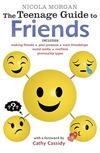 The Teenage Guide to Friends by Nicola Morgan
The Teenage Guide to Friends by Nicola Morgan
A comprehensive guide to teenage friendships, by award-winning author and well-being expert Nicola Morgan. Essential reading for teenagers and the adults who care about them.
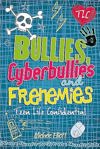 Bullies, cyberbullies and frenemies : teen life confidential by Michelle Elliott, illustrated by H. Venning
Bullies, cyberbullies and frenemies : teen life confidential by Michelle Elliott, illustrated by H. Venning
Friendships and peer relationships are one of the most difficult things about being a teen. Many face bullying of some kind or another, whether in person or on the Internet or social media. Written by Kidscape founder Michele Elliott, Teen Life Confidential: Bullies, Cyberbullies and Frenemies is a friendly, kind and practical guide to navigating these tricky relationships, and beating the bullies.
Low Mood/Sadness
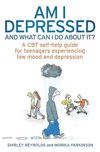 Am I Depressed and What Can I Do About It? A CBT self-help guide for teenagers experiencing low mood and depression by Shirley Reynolds and Monika Parkinson
Am I Depressed and What Can I Do About It? A CBT self-help guide for teenagers experiencing low mood and depression by Shirley Reynolds and Monika Parkinson
This accessible, engaging and age-appropriate self-help guide based on current research and best practice (NICE, IAPT treatment pathways, Books on Prescription, all of which promote CBT) for young people aged 13 to 17 who experience low mood and depression, and their friends, family and health professionals.
 Think Good, Feel Good: A Cognitive Behavioural Therapy Workbook for Children and Young People by Paul Stallard
Think Good, Feel Good: A Cognitive Behavioural Therapy Workbook for Children and Young People by Paul Stallard
Think Good, Feel Good is an exciting, practical resource that helps to help children and young people understand Cognitive Behaviour Therapy. It provides a range of flexible and highly appealing materials that can be used to structure and facilitate work with young people.
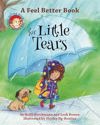 A Feel Better Book for Little Tears by Holly Brochmann, Leah Bowen and Shirley Ng-Benitez
A Feel Better Book for Little Tears by Holly Brochmann, Leah Bowen and Shirley Ng-Benitez
This rhyming book will help kids identify what it feels like to be sad and what they can do to respond to it.
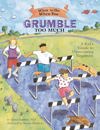 What to Do When You Grumble Too Much: A Kid’s Guide to Overcoming Negativity by Dawn Huebner
What to Do When You Grumble Too Much: A Kid’s Guide to Overcoming Negativity by Dawn Huebner
Did you know that life is like an obstacle course? It's exciting and fun, but full of tricky spots to get through. If you're a kid who feels so frustrated by those tricky spots that it's hard to enjoy the good things in life, this book is for you.




 What to Do When Your Temper Flares by Dawn Huebner and Bonnie Matthews
What to Do When Your Temper Flares by Dawn Huebner and Bonnie Matthews What to Do When It’s Not Fair by Jacqueline Toner, Clare Freeland and Dave Thompson
What to Do When It’s Not Fair by Jacqueline Toner, Clare Freeland and Dave Thompson A Feel Better Book for Little Tempers by Holly Brochmann, Leah Bowen and Shirley Ng-Benitez
A Feel Better Book for Little Tempers by Holly Brochmann, Leah Bowen and Shirley Ng-Benitez Starving the Anxiety Gremlin: a cognitive behavioural therapy workbook on anxiety management for young people by Kate Collins-Donnelly
Starving the Anxiety Gremlin: a cognitive behavioural therapy workbook on anxiety management for young people by Kate Collins-Donnelly Starving the Exam Stress Gremlin : a cognitive behavioural therapy workbook on managing exam stress for young people by Kate Collins-Donnelly
Starving the Exam Stress Gremlin : a cognitive behavioural therapy workbook on managing exam stress for young people by Kate Collins-Donnelly Something Bad Happened: A kid’s guide to coping with events in the news by Dawn Huebner & Karen McHale
Something Bad Happened: A kid’s guide to coping with events in the news by Dawn Huebner & Karen McHale Outsmarting Worry: An older kids’s guide to managing anxiety by Dawn Huebner and Karen McHale
Outsmarting Worry: An older kids’s guide to managing anxiety by Dawn Huebner and Karen McHale Think Good, Feel Good: A Cognitive Behavioural Therapy Workbook for Children and Young People by Paul Stallard
Think Good, Feel Good: A Cognitive Behavioural Therapy Workbook for Children and Young People by Paul Stallard Fighting Invisible Tigers: Stress Management for Teens by Earl Hipp
Fighting Invisible Tigers: Stress Management for Teens by Earl Hipp The Relaxation and stress reduction workbook for Teens by Michael Tompkins and Jonathan Barkin
The Relaxation and stress reduction workbook for Teens by Michael Tompkins and Jonathan Barkin Helping Your Child with Fears and Worries: A self-help guide for parents by Cathy Cresswell and Lucy Willetts
Helping Your Child with Fears and Worries: A self-help guide for parents by Cathy Cresswell and Lucy Willetts Relax Kids Pants of Peace: 52 Mindful Meditations for children by Marneta Viegas
Relax Kids Pants of Peace: 52 Mindful Meditations for children by Marneta Viegas Relax Kids The Wishing Star: 52 Meditations for children by Marneta Viegas
Relax Kids The Wishing Star: 52 Meditations for children by Marneta Viegas What to Do When You Don’t Want to Be Apart: A Kid’s Guide to Separation Anxiety by Kirsten
What to Do When You Don’t Want to Be Apart: A Kid’s Guide to Separation Anxiety by Kirsten Overcoming your child’s shyness and social anxiety: A self-help guide using Cognitive Behavioural Techniques by Lucy Willetts and Cathy Creswell
Overcoming your child’s shyness and social anxiety: A self-help guide using Cognitive Behavioural Techniques by Lucy Willetts and Cathy Creswell The Shyness and Social Anxiety Workbook for Teens: CBT and ACT skills to help you build your social confidence by Jennifer Shannon
The Shyness and Social Anxiety Workbook for Teens: CBT and ACT skills to help you build your social confidence by Jennifer Shannon Exploring Emotions: A mindfulness Guide to Understanding Feelings by Paul Christelis and Elisa Paganelli
Exploring Emotions: A mindfulness Guide to Understanding Feelings by Paul Christelis and Elisa Paganelli






 Parenting a Teen Who Has Intense Emotions: DBT Skills to Help Your Teen Navigate Emotional and Behavioural Challenges by Pat Harvey & Britt Rathbone
Parenting a Teen Who Has Intense Emotions: DBT Skills to Help Your Teen Navigate Emotional and Behavioural Challenges by Pat Harvey & Britt Rathbone Have You Filled a Bucket Today? A Guide to Daily Happiness for Kids By Carol McCloud
Have You Filled a Bucket Today? A Guide to Daily Happiness for Kids By Carol McCloud 

 The Panic Workbook for Teens: Breaking the Cycle of Fear, Worry, and Panic Attacks by Debra Kissen
The Panic Workbook for Teens: Breaking the Cycle of Fear, Worry, and Panic Attacks by Debra Kissen
 The Teenage Guide to Friends by Nicola Morgan
The Teenage Guide to Friends by Nicola Morgan Bullies, cyberbullies and frenemies : teen life confidential by Michelle Elliott, illustrated by H. Venning
Bullies, cyberbullies and frenemies : teen life confidential by Michelle Elliott, illustrated by H. Venning Am I Depressed and What Can I Do About It? A CBT self-help guide for teenagers experiencing low mood and depression by Shirley Reynolds and Monika Parkinson
Am I Depressed and What Can I Do About It? A CBT self-help guide for teenagers experiencing low mood and depression by Shirley Reynolds and Monika Parkinson A Feel Better Book for Little Tears by Holly Brochmann, Leah Bowen and Shirley Ng-Benitez
A Feel Better Book for Little Tears by Holly Brochmann, Leah Bowen and Shirley Ng-Benitez What to Do When You Grumble Too Much: A Kid’s Guide to Overcoming Negativity by Dawn Huebner
What to Do When You Grumble Too Much: A Kid’s Guide to Overcoming Negativity by Dawn Huebner


